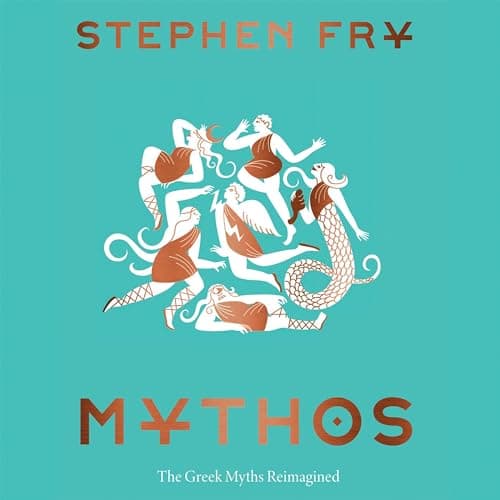Sapiens: A Brief History of Humankind by Yuval Noah Harari vs. Mythos by Stephen Fry
Sapiens: A Brief History of Humankind by Yuval Noah Harari
The great thing about this book is that it takes a big-picture view of human history. It attempts to explain the main themes of human history without getting bogged down in the details. Sapiens also debunks many popular myths about human history, including the one that people today live happier lives and have better diets than our hunter-gatherer predecessors. It comes with an epilogue about the future of humankind in light of ever-accelerating technological progress. With the recent advances in AI it is more relevant than ever. If you're going to read one book on history this year, read this one.
Mythos by Stephen Fry
Greek myths retold by Stephen Fry. He is both the author and the narrator of this book. His wit and sense of humor come across in both the text and in the delivery. Plus, you actually get to learn Greek myths.

Reviews
Reviews
| Item | Votes | Upvote |
|---|---|---|
| No pros yet, would you like to add one? | ||
| Item | Votes | Upvote |
|---|---|---|
| No cons yet, would you like to add one? | ||
| Item | Votes | Upvote |
|---|---|---|
| No pros yet, would you like to add one? | ||
| Item | Votes | Upvote |
|---|---|---|
| No cons yet, would you like to add one? | ||
Frequently Asked Questions
'Sapiens' provides a comprehensive overview of human history, focusing on major themes and debunking myths about our past, making it ideal for readers seeking a broad understanding of humanity's journey. In contrast, 'Mythos' focuses specifically on Greek myths, offering a retelling that is entertaining and humorous but does not cover the wider scope of human history. Therefore, if your goal is to understand human history as a whole, 'Sapiens' is the better choice.
'Mythos' is narrated by Stephen Fry, whose wit and humor enhance the storytelling of Greek myths, making it a more engaging read for those who appreciate a light-hearted approach. 'Sapiens', while informative and thought-provoking, adopts a more academic tone that may not be as engaging for all readers. Thus, if you prefer a narrative style that is entertaining and humorous, 'Mythos' would be the better option.
'Sapiens' includes an epilogue discussing the future of humankind in the context of technological advancements, making it relevant for readers interested in contemporary issues and future implications. 'Mythos', however, focuses solely on retelling ancient myths without addressing modern or future contexts. Therefore, for insights into the future of humanity, 'Sapiens' is the superior choice.
'Sapiens: A Brief History of Humankind' by Yuval Noah Harari takes a big-picture view of human history. It explains the main themes of human evolution and development without getting bogged down in details. The book also debunks many popular myths about human history, such as the idea that people today live happier lives or have better diets than our hunter-gatherer predecessors. It ends with an epilogue discussing the future of humankind in light of accelerating technological progress, making it particularly relevant given recent advances in AI.
'Sapiens: A Brief History of Humankind' discusses several main themes, including the cognitive revolution, the agricultural revolution, the unification of humankind, and the scientific revolution. The book explores how these events have shaped human societies, cultures, and economies. It also delves into the impact of technological advancements on the future of humanity.
Yuval Noah Harari is an Israeli historian and professor in the Department of History at the Hebrew University of Jerusalem. He is known for his bestselling books 'Sapiens: A Brief History of Humankind', 'Homo Deus: A Brief History of Tomorrow', and '21 Lessons for the 21st Century'. Harari's work focuses on broad historical processes and their implications for the future.
Pros of 'Sapiens: A Brief History of Humankind' include its broad, comprehensive view of human history and its ability to debunk popular myths. The book is also praised for its engaging writing style and thought-provoking insights. Cons might include its broad scope, which can sometimes lead to oversimplification of complex historical events, and the fact that some readers may find its speculative future predictions less convincing.
'Mythos by Stephen Fry' is a retelling of Greek myths. Stephen Fry, who is both the author and the narrator, brings his signature wit and sense of humor to the stories. The book covers various Greek myths, providing an entertaining and educational experience.
Stephen Fry is a British comedian, actor, writer, and presenter. He is known for his sharp wit and intelligent humor. He has written several books and has narrated many audiobooks, including 'Mythos,' where he retells Greek myths with a unique and engaging style.
The main features of 'Mythos by Stephen Fry' include its engaging retelling of Greek myths, Stephen Fry's witty and humorous writing style, and his captivating narration in the audiobook version. The book offers both entertainment and educational value, making it a delightful read for those interested in mythology.




















